|
On 25 October 2011, the Government of Japan, in close cooperation with the United Nations, hosted an event to announce the winners of their co-sponsored social media “Poetry for Peace” contest and to introduce two of the Hibakusha (atomic bomb survivors) whom Japan appointed as “Special Communicators for a World without Nuclear Weapons.” This special ceremony took place at the permanent disarmament exhibition near the UN General Assembly Hall, which displays a statue of St. Agnes from Nagasaki as well as other remains from the bombings in Hiroshima and Nagasaki. Attended by representatives of UN Member States, NGOs, the media, and local junior high school and high school students, the event was also broadcast on the Internet by UNTV.
In his remarks, Ambassador Tsuneo Nishida, Permanent Representative of Japan to the UN, introduced Ms. Kazu Sueishi and Ms. Setsuko Thurlow, the first “Special Communicators for a World without Nuclear Weapons” to visit the UN. He also talked about Japan and the UN’s collaboration to translate the testimonies of Hibakusha into multiple languages and Japan’s continuing efforts to promote disarmament and non-proliferation education. Mr. Kiyotaka Akasaka, UN Under-Secretary-General for the Department of Public Information and Ms. Hannelore Hoppe, Director and Deputy to the High Representative of the UN Office of Disarmament Affairs then made speeches, noting that over 700 poems were submitted from all over the world in response to the testimonies of Hibakusha.
The winners of the “Poetry for Peace” Contest were announced by Ms. Monique Coleman, UN Youth Champion and popular actress and singer, and the winning poems were read by three UN interns. They were accompanied by three young violinists who have performed in Hiroshima and Nagasaki.
After the poems were read, Ms. Sueishi and Ms. Thurlow commented on the significance of the “Poetry for Peace” contest and the importance of nuclear disarmament. Ms. Sueishi, who was an eighteen-year-old high school student in Hiroshima at the time of the atomic bombing and now lives in California, sent a strong message to the local students who attended this event that the devastation caused by the use of atomic bombs should never again be experienced. She asked the students to repeat “No more Hiroshima, no more Nagasaki.” Ms. Thurlow, who was affected by the Hiroshima bombing at age thirteen and currently resides in Toronto, Canada, described how the poems submitted to the contest brought back her memories of the bombing. She stressed the need to share these horrific memories with younger generations so that they remain involved in efforts to attain world peace.
This event provided the opportunity for Japan to show to UN diplomats as well as the general public its ongoing efforts to promote disarmament and non-proliferation education. The “Poetry for Peace” Contest drew the attention of youth from all over the world by utilizing a popular social media website, Facebook. Through this contest, and especially through this event, Japan and the UN gave young people around the world the chance to listen to testimonies of Hibakusha and to realize the importance of achieving “a world without nuclear weapons.”
|
 |
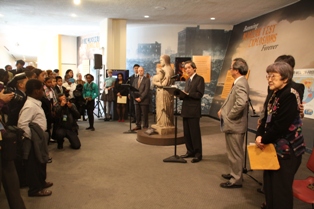
Ambassador Nishida giving opening remarks
|
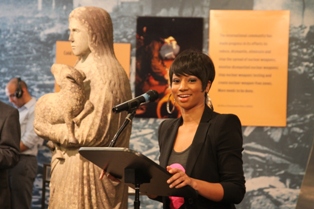
UN Youth Champion, Monique Coleman, announcing the winners
|
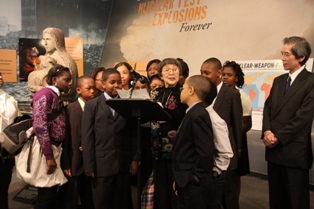
Special Communicator, Ms. Kazu Sueishi, calling for "No More Hiroshima" with local New York school students
|
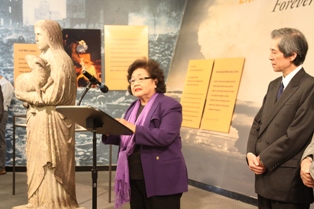
Special Communicator, Ms. Setsuko Thurlow, commenting on the winning poems of the Poetry for Peace Contes
|
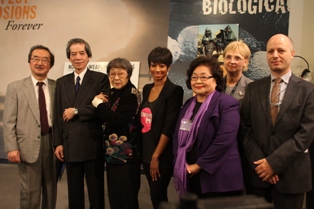
Participants of the event: from left, Mr. Akasaka, Ambassador Nishida, Ms. Sueishi, Ms. Coleman, Ms. Thurlow, Ms. Hoppe, and the Master of Ceremony
|
|
|
|
|
|
|

